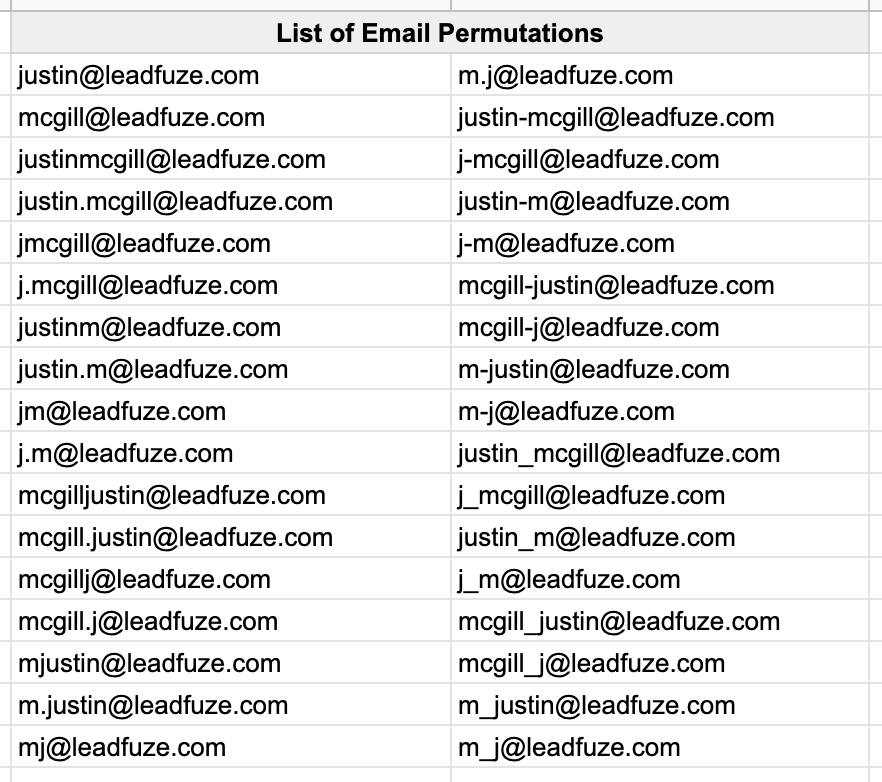Great Ideas On Deciding On An Email List Website
Wiki Article
What Should I Think About When Purchasing A Hematologist Email List?
To ensure the most efficient outcomes, you need to think about a number of elements. These include whether or the information is accurate, legal, and pertinent to your marketing goals. These are the most crucial considerations to consider. Quality of data and accuracy
Source of Information Verify that the email list providers use reliable sources. For example, confirm whether they are using professional directories (such as an medical database) or verified opt-ins from hematologists. The accuracy of the information gathered will determine the quality and accuracy of the email list.
Updates and verification: Find out the method used by the service provider to verify the accuracy of data. Emails should be validated to remove inactive or incorrect addresses. It is essential to update the list frequently, since healthcare professionals are able to alter their jobs or even institutions.
Segmentation of the List The list needs to be segmented by subspecialties (e.g. pediatric or oncology) and years of experience and affiliation with a hospital. The well-organized list can help you focus your outreach more effectively.
2. Conformity to Legal Regulations
Data Privacy Laws – Ensure that the list is compliant with applicable legislation and regulations for example California Consumer Privacy Acts in the U.S.A. or General Data Protection Regulations in Europe. It is a requirement that email addresses should be collected only with consent.
CAN-SPAM Act: In the U.S., ensure the list of recipients is in compliance with the CANSPAM Act, which regulates commercial email communications. Your email messages could be branded as spam if you don't conform to.
Opt-in Consent. The list of email recipients should consist of hematologists who have explicitly agreed to receive emails from third parties. Unsolicited emails sent to individuals without their consent could lead to lower engagement and legal problems.
3. Provider Reputation
Verify the reputation of the company. Look for reviews, testimonials as well as case studies to verify that the organization is trustworthy. A reputable company that has a history of delivering top-quality and accurate information is more likely.
Transparency: Choose a service that is clear regarding the source of data. Providers who are vague and unclear about the method they collect data ought to be avoided.
Customer Service: It's important to choose a company that offers high-quality customer service. It is possible that you require assistance with technical issues, list customization, or questions about compliance, and strong support can make all the difference.
4. Cost as well as Return on Investment (ROI)
Pricing Model: Pay attention to the pricing model. Are you paying a flat fee or a pay-per -contact? Check that the price is in line with the ROI potential. Also, consider balancing the quality of the list and its quantity with the marketing budget.
Refund or replacement policy: A reputable service company will offer refunds or replacements to customers with inactive or invalid email addresses. Clarify any terms and conditions before you make a purchase.
Value for money: Check the features on the lists (such as segmentation, and the accuracy guarantee offered by the company) against the cost. The list with the lowest price does not ensure the highest value in terms of value if it is based on poor quality data.
5. Ownership of data and use
Understanding the distinction between Single Use and Multiple Use Multiple Use: Make sure you are aware of the conditions that apply to using the list of email addresses. Some email providers will allow only you to use their list for a single campaign. Others may give you complete ownership and unlimited usage rights.
Exclusive vs. Shared Lists: Determine if the email list is only for your business or is shared with buyers. Exclusive lists typically offer better engagement, as the contacts are less likely to have received emails from marketing from multiple sources.
6. Data Integration and Format
Integration with CRM and Email tools: Check that the list can be easily integrated into your CRM platform or marketing tools for email. The list must be available in common formats, like CSV and Excel. This allows for an easy integration.
The list must be simple to control and filter. Lists with a lot of data that are difficult to manage or segment can decrease the effectiveness and efficacy of your marketing campaign.
7. Ethical Aspects
Relevance for Hematologists Consider ensuring that your email outreach is relevant to hematologists. Not sending them content that does not match their expertise might result in poor engagement, and could negatively affect your reputation.
Avoid spam practices: Don't bombard recipients with a lot of emails. Sending spam complaints could damage your reputation if you send out too many emails.
Also, you can read our conclusion.
The purchase of a hematologist list can be a powerful tool for targeted marketing. However, it must be done with a sense of. You should focus on the quality of information and privacy laws and the credibility of the provider to obtain a reliable and valuable list. By prioritizing segmentation, legal compliance and ethical marketing, you'll be able to maximize your ROI and maintain a positive brand reputation in your outreach activities. Follow the top rated hematologists email list for site guide.

What Should I Be Thinking About When Buying An Oncologist Email List?
When buying an oncologist's email list, you need to think about factors that can ensure the list is high-quality legal and targeted to your specific marketing goals. Here are the most important considerations to consider: 1. Data quality and accuracy
The source of data: Check that the information is sourced from reliable and reputable sources such as medical directories, professional associations or healthcare databases. Beware of lists from untrustworthy sources or that have been not verified, as they could have outdated information.
Verification Process: The list service must have a solid verification process in place to ensure the email addresses are accurate authentic, current, and valid. The list provider should regularly cleanse and update the list to remove incorrect, duplicate or inactive contact. This will ensure higher delivery rates.
Segmentation: An oncologist mailing list that is of good quality should allow for segmentation. Being able to filter the list by subspecialties (e.g., pediatric oncology, surgical oncology, hematology-oncology), geographic location, years of experience, or institution allows for more targeted outreach, increasing the likelihood of engagement.
2. Conformity to Legal Regulations
Data Privacy Regulations: Ensure the email lists are compliant with laws regarding data privacy, like the General Data Protection Regulation (GDPR) in Europe and the California Consumer Privacy Act (CCPA) in the U.S., and other relevant regulations. The email addresses have to be processed and collected legally, respecting data privacy and consent.
CAN SPAM Act Compliance: Ensure that all campaigns in the U.S. comply with the CAN SPAM Act, which regulates commercial email communications. It is recommended to include an opt-out button in your email, make sure your subject lines are accurate and be sure to not mislead your recipients. Infractions could lead to penalties and can damage your reputation.
Opt-In Consent - Ensure that the email addresses in the list were collected by consent. Oncologists need to have given consent to receive marketing messages. This will ensure compliance with privacy laws and reduces chances of legal problems or spam complaints.
3. Provider Reputation
Reputable Provider - It's essential to buy your list from a expert with a strong reputation. To verify their credibility, you can examine their past work, read reviews, testimonials or case studies. Established providers tend to have more accurate and legal and legal data.
Transparency - The provider must be clear about the source of data and the frequency of its updating and the methods of verification. Insufficient transparency could be a sign that data quality is not at standard.
Customer Support: Choose a provider that offers responsive customer service in the event that you need assistance with the list or have questions about integration, segmentation, or conformity.
4. Cost and ROI
Pricing Structure: Learn the pricing structure, whether it's determined by the amount of contacts you have, a flat fee, or subscription-based. Be aware of what the model of pricing is aligned with your budget for marketing and the anticipated return on investment.
Refund or Replacement policy: A reliable service provider will provide either replacement or refund policies for inactive or obsolete emails. Clarify the terms of purchase prior to making a purchase in order to ensure your investment is protected.
Do not focus on the price alone. A cheaper list might be appealing but if it ends in poor delivery or low engagement, it can ultimately harm your campaign. Make sure the data you use is current and accurate.
5. Data Ownership and Usage
If you're unsure, ask if it is only for one-time use or if ownership will allow for continuous use. Single-use lists might be less expensive, however if you plan multiple campaigns, owning the list may provide greater flexibility and longer-term value.
Exclusive vs. Shared Lists. Check if the list you have is exclusive or available to multiple buyers. Exclusive lists can be more beneficial since they can reduce the amount of exhaustion in the audience, which can lead to a greater level of engagement.
6. Data Integration and Format
Integration with CRM: Make sure that your list can easily be transferred into your Customer Relationship Management (CRM), or email marketing tools. The list should be presented in a format that is easy to integrate, like CSV.
Segmentation Ease: The list must be simple to manage and segment within your CRM. If you are able to quickly filter by criteria, such as specialties in oncology or geographical area, it will increase the effectiveness of your campaigns.
7. Ethical Considerations
Relevance in Messaging Oncologists is a high-skilled professionals with very busy schedules. Be sure that your message is pertinent to their interests or work, such as medical equipment, continuing education or advancements in pharmaceutical technology. Inappropriate emails can lead to a poor image of the brand and lower participation.
Beware of Spam. Don't over-email or send unsolicited email messages. This could lead to spam complaints. Maintain a reasonable email frequency to keep your audience engaged without overwhelming them with messages.
Conclusion
When you purchase an email list of oncologists you must consider accuracy of the data and legal conformity. Also, consider the credibility of your supplier. Make sure that the list is segmented and properly validated, and tailored to the audience you want to reach. With these considerations, you can create an effective, compliant outreach plan that is effective, maximizes engagement and delivers strong results. Follow the expert oncologist email list for more examples.
